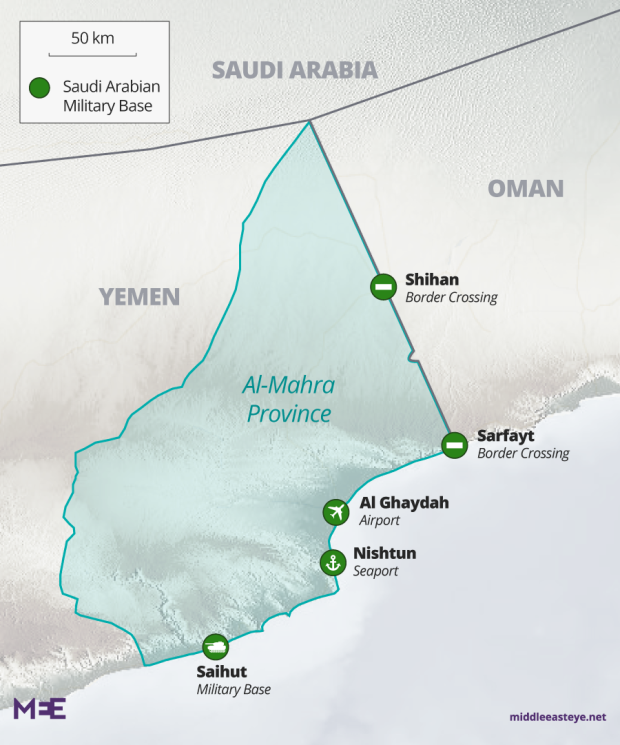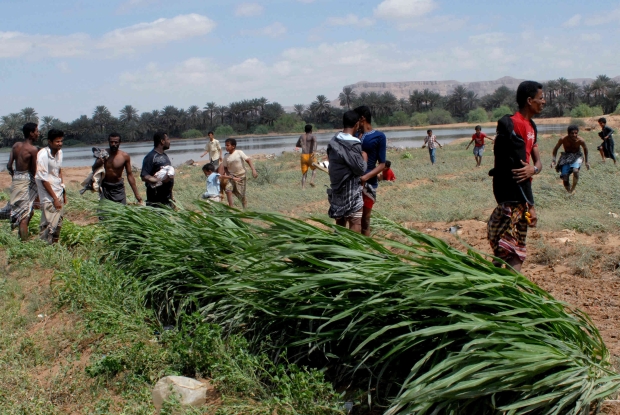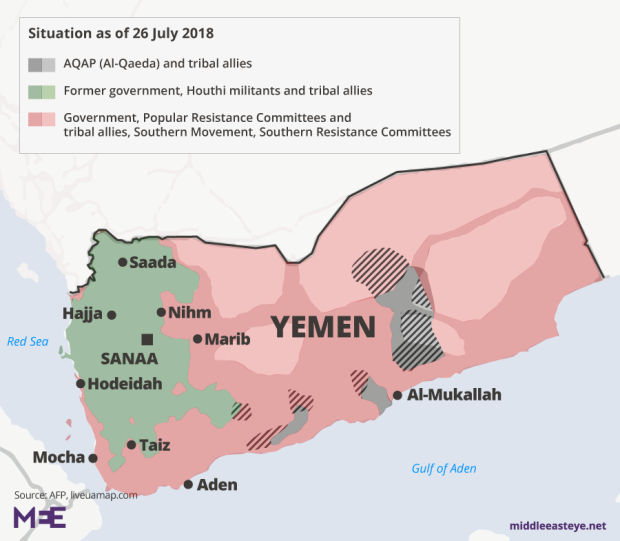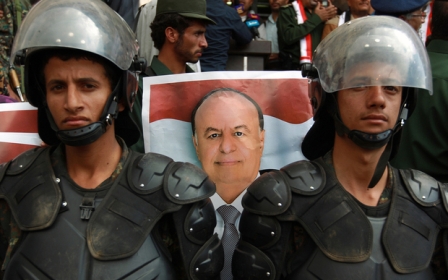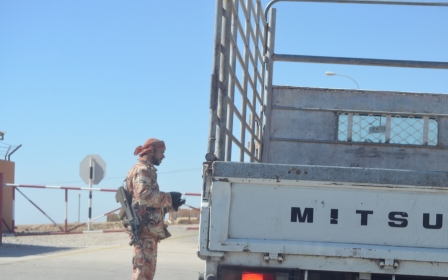Saudi military colonialism sparks protest movement in Yemen's east
SANAA - For three months, Yemen’s al-Mahrah has been drenched in rain, as the yearly monsoon – or Khareef – empties on the eastern province.
The rains have soaked al-Mahrah’s southern peaks and valleys, turning them a verdant green, and left an earie fog along the coastline.
Yet while the seasonal storm may have now receded, another far more serious one is brewing.
In recent weeks, al-Mahrah has witnessed protests against a Saudi military presence that its detractors say is tantamount to extortion and colonialism.
The Saudis, who intervened in Yemen’s war on behalf of the internationally recognized government against the Houthi rebels in 2015, first began setting military bases up in the province late last year.
Yet from the moment the Saudis set up their first base in the province, its residents began pushing back, staging protests and asking why Riyadh’s military needs to have a presence in a largely peaceful area that has been mostly spared by the three-year conflict.
Since early August however, when Yemeni President Abd Rabbuh Mansour Hadi visited the province and backed the Saudi presence, the tense atmosphere has worsened considerably.
Now stepping up their protest movement, al-Mahrah’s residents are appealing to the outside world, telling the international community that their province is already safe and they do not need foreign soldiers cementing a presence in their home.
Local reservations
Osamah, a 35-year-old resident of al-Mahrah, has participated in several protests against the Saudi presence – the most recent being 17 September. He said he will not stop protesting until the Saudis leave his home.
"Ever since they got the green light from President Hadi, the Saudis have been the main controllers of the province," Osamah told Middle East Eye.
"Their presence threatens the future of al-Mahrah because they are invaders and they have already set up their military bases in the province."
According to Osamah, the Saudis have total control of the border crossings between al-Mahrah and neighbouring Oman, as well as Nishtawan port and Ghaida airport. Their forces have set up checkpoints across the province, and have positioned significant numbers in the coastal town of Sayhut.
The bases residents describe are of varying size, some little more than a dozen soldiers enclosed by fencing, others far more substantial. In key positions such as Nishtawan port and Ghaida airport, Yemeni soldiers have been completely replaced by Saudi ones.
"The Saudis have set up their military bases in several areas, but there is no need to because the Houthis haven’t come to al-Mahrah and we didn’t ask them to help keep us safe,” Osamah said.Hadi’s trip to al-Mahrah in August was his first since 2012, early in his presidency. Ostensibly, he was there to promote the launch of reconstruction projects in partnership with the Saudis, including building a water purification plant, power plant and hospitals.
Yet the sight of Hadi meeting Saudis in al-Mahrah and laying foundation stones in ceremonial fashion only succeeded in angering many of the province’s residents, encouraging them to escalate their protest movement.
"Hadi welcomed the Saudis’ intervention and after his visit to al-Mahrah, the Saudis tried to set up four new military bases in Sayhut, but residents prevented them from doing so," Osamah said.
Residents will keep protesting until the last Saudi soldier leaves our province
- Osamah, al-Mahrah resident
"That was a clear message that Hadi does not represent the residents of al-Mahrah."
In an attempt to placate the growing discontent in the region, Saudi Arabia in June promised it would hand all of the bases and facilities under its control to Yemeni forces over two months and exit al-Mahrah.
For two months the protests, which sometimes included hundreds of Yemenis, were quelled. But by September it became clear to residents that not only had the Saudis reneged on their promise, their presence in the province had grown.
"Residents will keep protesting until the last Saudi soldier leaves our province," Osamah said.
Tackling smuggling
Reconstruction projects aren’t the only reasons given for the Saudi presence, however.
Riyadh has said on several occasions that it has serious concerns about the Houthis smuggling weapons through Oman.
But Hamid bin Ali, a political activist in al-Mahrah, said that smuggling is only a pretext for the Saudis to take over the province. He speculated that economic interests may lie behind the takeover.
"The governor has confirmed that there is no smuggling in al-Mahrah, so [officially] there is no need for the Saudis," bin Ali told MEE. "Moreover, military bases have been set up in residential areas and not in areas where smuggling may happen."
The Houthis began sweeping across Yemen in 2014, taking the capital Sanaa and the key southern port city Aden on their way. Much of their territory has now been rolled back by pro-Yemeni government forces.
Al-Mahrah, however, never fell into the rebels’ hands, and the Yemeni army forces stationed there have had unwavering support for Hadi and his government.
"The Yemeni forces in al-Mahrah do not belong to the Houthis and they can protect the province from smuggling and from any other local threats - but they cannot protect us from the Saudis," bin Ali said.
Economic tensions
Not everyone in al-Mahrah is against the Saudi presence.
"Saudis are our neighbors and there is no problem in helping us by protecting Yemen from smuggling, as they work shoulder to shoulder with Yemeni authorities," Soroor, an al-Mahrah resident, told MEE.
However, residents like Osamah, who are in the majority, believe the Saudis are concealing their real plans.
"The Saudis are not happy to just protect us from smuggling; they are doing this step for economic purposes,” he said.
In August, Jordanian news site Arabi21 obtained documents detailing a Saudi plan to build an oil exportation port in the province.
At 560km long, al-Mahrah’s coastline is the longest of any province in Yemen.
And while that may be an attractive prospect for a Saudi government keen to find new outlets for its key resource – oil – it is also the source of livelihood for hundreds of Yemeni fishermen.
The grumblings in al-Mahrah are not reserved for the street, and discontent over the Saudi role can be found in the province’s halls of power, too.
"No one is happy with the Saudi presence in the province, even the president himself, but no one can oppose them," an official in the province told MEE, on condition of anonymity because of security concerns.
"Smuggling is only a pretext and we do not know what is behind the Saudi interest in the area," he said. "Saudis are invaders with presidential permission."
Saudi-Emirati rivalry
The Saudi presence in al-Mahrah has had the rare effect of being a subject that both pro-government and pro-Houthi Yemenis can agree on.
And ironically, it may point to a division growing in the military coalition in Yemen that Saudi Arabia is leading, as Riyadh and its close ally the United Arab Emirates (UAE) vie for influence in the country.
"The current war in Yemen does not have any relationship with recapturing the [government’s] legitimacy and ending the coup, rather it is a war of Saudi and Emirati invasion aims, where Saudi Arabia takes over al-Mahrah and [the neighbouring province of] Hadhramout, and the UAE takes over the islands, ports, airports and beaches. It is a complete invasion," pro-Hadi Yemeni journalist Abbas al-Dhaleai said on Twitter.
According to Dhaleai, Yemenis need to wake up and reject Saudi Arabia and the UAE’s deception.
Speaking to MEE, Houthi political analyst Mohammed al-Dailami agreed with Dhaleai’s opinion and said he believes that Saudi Arabia may use al-Mahrah for investment or other future economic purposes.
"The split between the UAE and Saudi Arabia has already happened and the main purpose of this division is economic, as both want to absorb the wealth of Yemen," Dailami told MEE.
As for Hadi, Dailami said, he is only a follower of the Saudis and he cannot oppose them.
In June, MEE revealed that Hadi – who has previously likened the Emirati presence in his country to an occupation – was forced by Saudi Arabia and the UAE to back an assault on the key western city of Hodeidah against his will.
Umbridge with Oman
Al-Mahrah is known as the gateway to Yemen’s east, and it runs down the length of Oman’s border with the country.
The sultanate is a member of the Gulf Cooperation Council, with traditionally warm relations with Riyadh and Abu Dhabi.
Despite this, however, Oman has – as it often does in regional conflicts – preferred to play honest broker rather than warmonger. It has occasionally hosted stillborn peace negotiations since the Saudi intervention in 2015.
The split between the UAE and Saudi Arabia has already happened and the main purpose of this division is economic, as both want to absorb the wealth of Yemen
- Mohammed al-Dailami, analyst
But to Riyadh’s chagrin, Oman has also served as a home for some Houthi leaders, such as spokesman Mohammed Abdul Salam, and others often visit the country from Yemen.
Mohammed Ali, a seasoned Yemeni journalist based in Taiz, told MEE the Saudi-Omani relationship has become extremely sensitive due to Muscat’s refusal to join the anti-Houthi coalition.
"Oman is an independent country and it accepts all sides independently, so it did not participate in the war against the Houthis and it did not support the Houthis against the Saudi-led coalition," Ali said.
"Some Houthis live in Oman… and also Saudi officials visit Oman, but Saudi Arabia considers Oman to be a supporter of the Houthis because it did not reject them."
Ali believes that the relationship between Oman and Saudi Arabia may worsen if Riyadh accuses Muscat officially of smuggling weapons to the Houthis.
Many Yemenis, including Ali, see Saudi Arabia’s al-Mahrah takeover as a warning to Oman – whose riches have allowed it to pursue a more independent foreign policy - telling Muscat that it will not accept any movement of goods, weapons or people across the border.
Regional considerations and tensions aside, for al-Mahrah residents like Osamah, the power to free the province lies in their hands alone."We will escalate until our province returns as before, and we will set up protest camps near the Saudi military bases in several areas of al-Mahrah," Osamah said.
"We are peaceful people and we do not use weapons, so Saudis exploit our peace to invade our province - but that does not mean we do not have ways to escalate. We have some steps of escalation and the whole world will hear about our matter soon."
Middle East Eye propose une couverture et une analyse indépendantes et incomparables du Moyen-Orient, de l’Afrique du Nord et d’autres régions du monde. Pour en savoir plus sur la reprise de ce contenu et les frais qui s’appliquent, veuillez remplir ce formulaire [en anglais]. Pour en savoir plus sur MEE, cliquez ici [en anglais].


